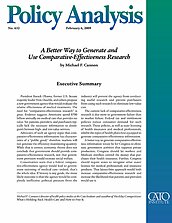President Barack Obama, former U.S. Senate majority leader Tom Daschle, and others propose a new government agency that would evaluate the relative effectiveness of medical treatments. The need for “comparative-effectiveness research” is great. Evidence suggests Americans spend $700 billion annually on medical care that provides no value. Yet patients, providers, and purchasers typically lack the necessary information to distinguish between high- and low-value services.
Advocates of such an agency argue that comparative- effectiveness information has characteristics of a “public good,” therefore markets will not generate the efficiency-maximizing quantity. While that is correct, economic theory does not conclude that government should provide comparative- effectiveness research, nor that government provision would increase social welfare.
Conservatives warn that a federal comparative- effectiveness agency would lead to government rationing of medical care—indeed, that’s the whole idea. If history is any guide, the more likely outcome is that the agency would be completely ineffective: political pressure from the industry will prevent the agency from conducting useful research and prevent purchasers from using such research to eliminate low-value care.
The current lack of comparative-effectiveness research is due more to government failure than to market failure. Federal tax and entitlement policies reduce consumer demand for such research. Those policies, as well as state licensing of health insurance and medical professionals, inhibit the types of health plans best equipped to generate comparative-effectiveness information.
A better way to generate comparative-effectiveness information would be for Congress to eliminate government activities that suppress private production. Congress should let workers and Medicare enrollees control the money that purchases their health insurance. Further, Congress should require states to recognize other states’ licenses for medical professionals and insurance products. That laissez-faire approach would both increase comparative-effectiveness research and increase the likelihood that patients and providers would use it.

This work is licensed under a Creative Commons Attribution-NonCommercial-ShareAlike 4.0 International License.

